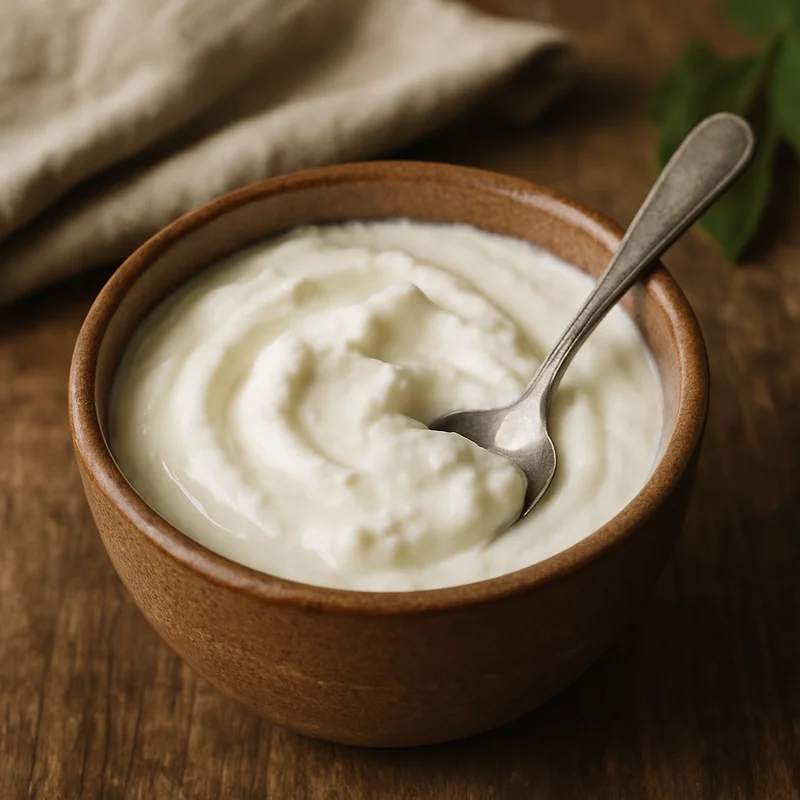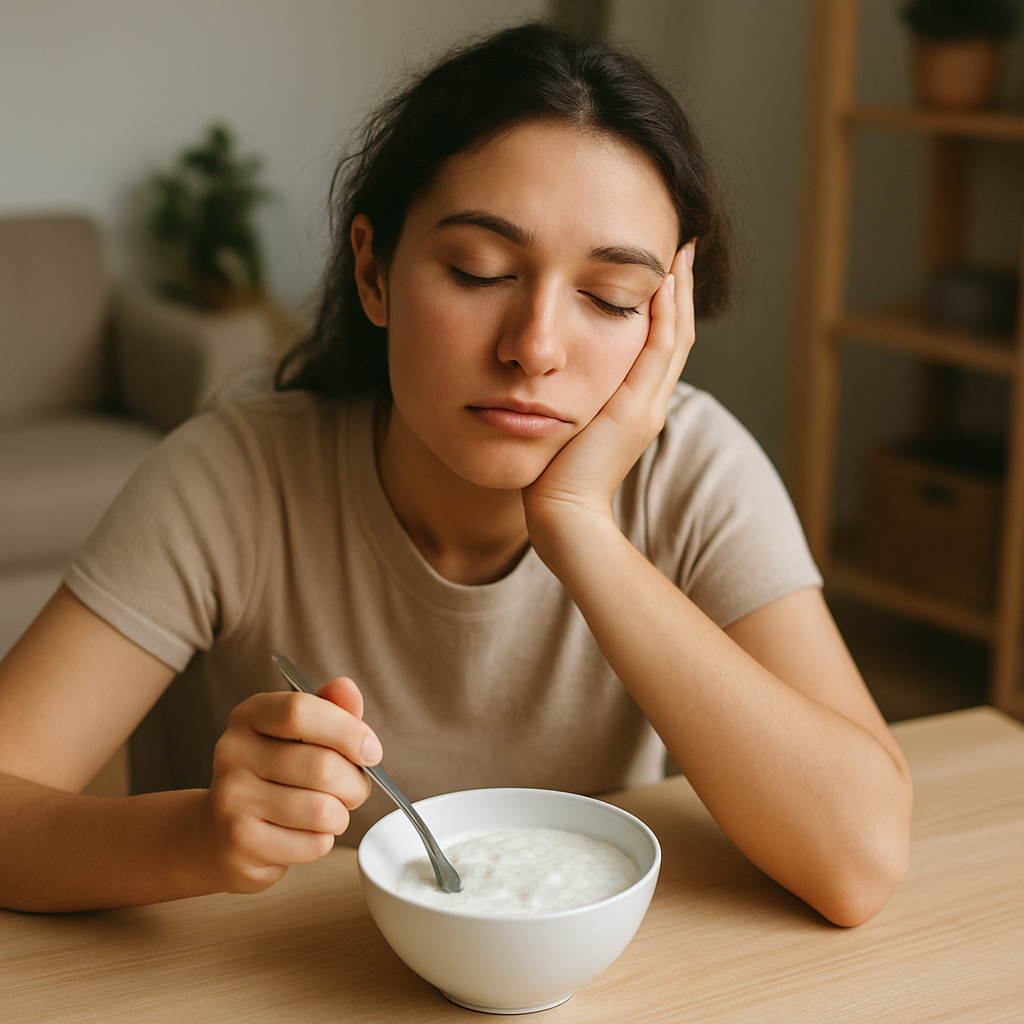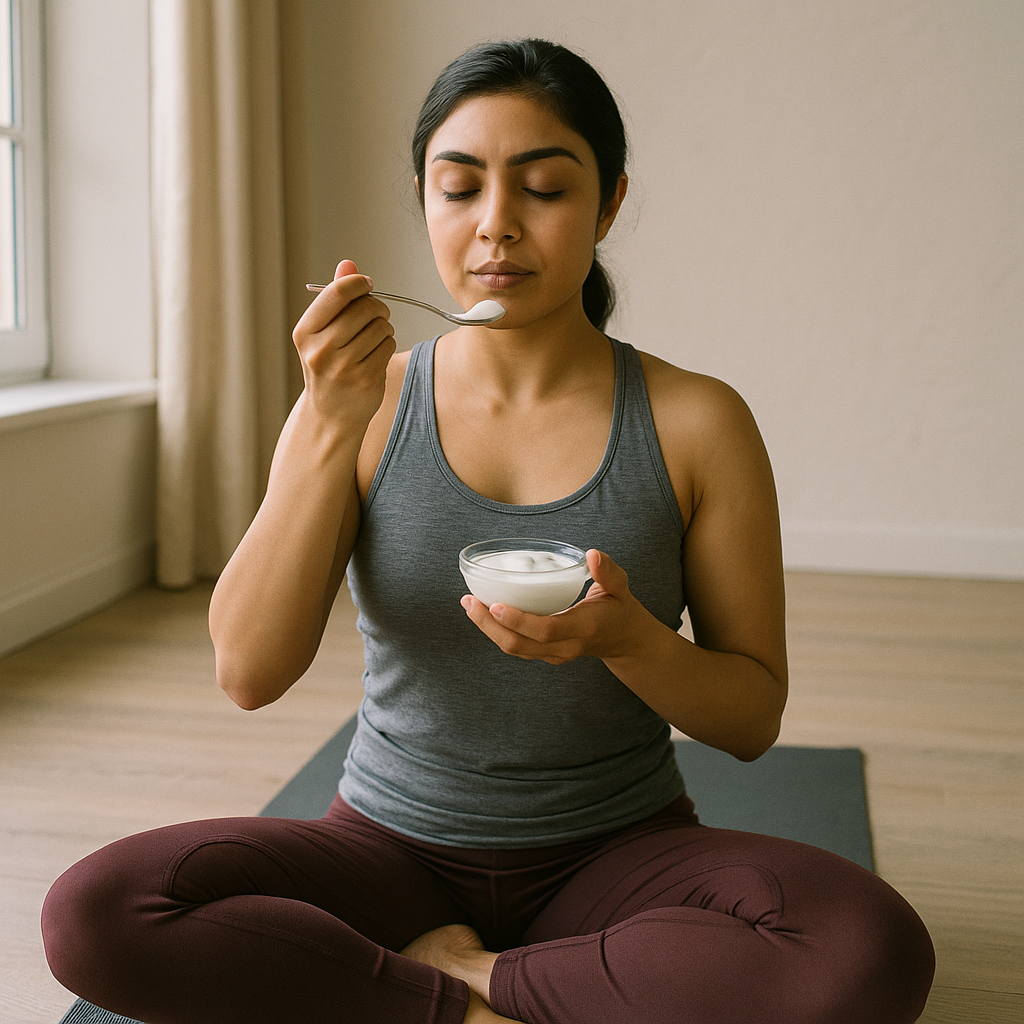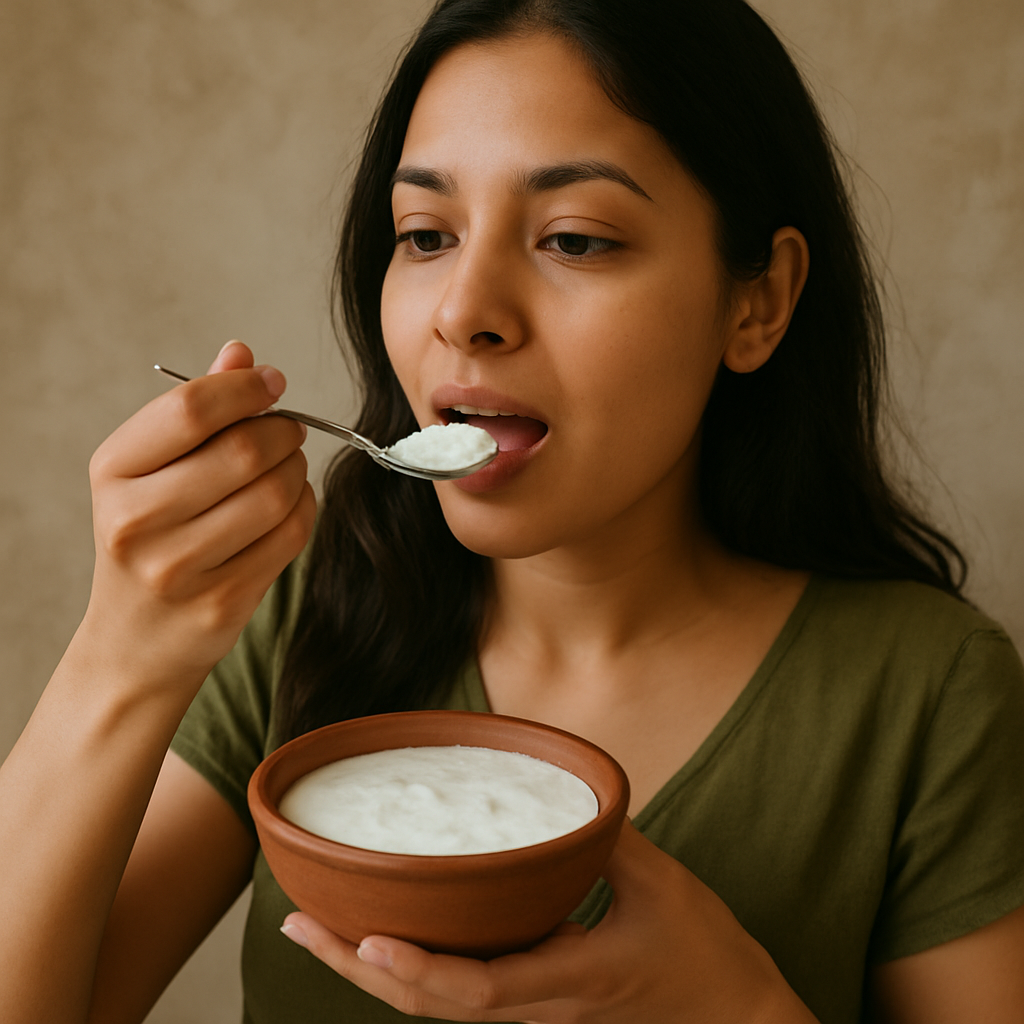Does Curd Make You Sleepy? A Deep Dive Through the Lens of Ayurveda

Introduction: Does Curd Make You Sleepy? Ayurveda Might Surprise You
Okay, first — weird question, right? “Does curd make you sleepy?” It's the kind of thing you only ask when you've just finished a big bowl of dahi after lunch and suddenly find yourself yawning. And maybe you've heard your grandmother say something like, “Curd at night? Not good for you — it slows everything down.” Old wives’ tale or ancient wisdom?
Turns out, there's more to it than meets the spoon. Ayurveda — India’s millennia-old system of natural health — has a lot to say about curd. About how, when, and even with whom (yes, foods have “friendships” in Ayurveda) you should eat it.
This article isn’t about fear-mongering or glorifying curd as some magic potion either. It’s about understanding how curd fits into your body, your energy, your daily rhythm — and whether that sluggish, post-meal haze is coincidence or a clue.
If you’re here, you're likely either:
-
Wondering why curd knocks you out after meals;
-
Trying to align with Ayurvedic practices;
-
Or just genuinely confused because “yogurt is healthy, right?”
Well, yes. And... maybe no.
That’s where Ayurveda’s beauty comes in — it doesn’t give you “one-size-fits-all” rules. It gives you patterns, principles, and practical ways to live better. And when it comes to things like digestion, sleepiness, and diet — especially something as deceptively simple as curd — the wisdom is surprisingly nuanced.
So in this article, we’ll:
-
Explore what Ayurveda really says about curd and sleep;
-
Unpack how your dosha, season, time of day, and meal pairing matter;
-
Offer easy lifestyle and diet tweaks;
-
And keep things real. Because honestly, we’re not all monks living on ghee and guggulu.
Expect insight, curiosity, and maybe a few mental “aha”s — whether you’re a die-hard Ayurveda believer or just curd-curious.

Understanding the Role of Ayurveda in Managing “Does Curd Make You Sleepy?”
What Ayurveda Says About “Does Curd Make You Sleepy”
Let’s start bluntly: Yes, Ayurveda says curd can make you feel heavy, dull, and — you guessed it — sleepy.
But here’s the kicker: it depends.
Curd (dahi) is considered “guru” in Ayurveda — meaning “heavy” to digest. It increases Kapha dosha, the energy principle associated with earth and water, stability, and yes, lethargy. Think of that sluggish, cloudy feeling after a heavy meal — that’s textbook Kapha overload.
Also: Ayurveda is very specific about when you eat curd.
-
Morning or noon? Fine, maybe even beneficial in moderation.
-
Nighttime curd? Big no-no. It’s considered cold, mucus-forming, and tamasic (promoting inertia and sleepiness).
In fact, many Ayurvedic texts advise avoiding curd altogether after sunset, unless it’s been modified — like whisked into buttermilk or spiced with digestive herbs.
Another important nuance: not all people react the same way.
-
Kapha-dominant individuals? More likely to feel sluggish or bloated after curd.
-
Pitta types might tolerate it better in summer — but only in moderation.
-
Vata folks could find it soothing, but again, context matters.
So no, curd isn’t “bad.” But it can mess with your energy, depending on the situation.
How Ayurvedic Lifestyle & Diet Directly Impact the “Curd = Sleepy?” Question
Ayurveda doesn’t isolate food from the rest of life. It looks at your whole rhythm — meals, sleep, activity, even your emotional state.
If your agni (digestive fire) is weak — and you’re eating curd with rice, late at night, in winter — you’re stacking the odds for heaviness and sluggishness. It’s like throwing wet wood on a low flame. You don’t get energy. You get smoke. And sleep.
On the other hand, if you:
-
Eat curd during the day,
-
Add digestive spices like cumin or black pepper,
-
Or convert it to takra (buttermilk) with rock salt and coriander,
…you might not feel sleepy at all. You might actually feel light and refreshed.
Context is everything. Ayurveda doesn’t vilify curd. It gives you a playbook for how to use it right.
The Importance of Individualized Ayurvedic Approaches for “Does Curd Make You Sleepy?”
Let’s get real for a second.
One person eats curd and feels calm and content. Another gets brain fog and bloating. What gives?
That’s exactly why Ayurveda focuses on personalized care. Your dosha, lifestyle, stress levels, digestive strength, even the climate you live in — all affect how curd interacts with your system.
That’s why someone in humid Kerala might feel different about curd than someone in dry Rajasthan. Why your cousin thrives on lassi but you get drowsy after just a spoonful.
So next time someone says, “Curd is healthy,” just nod politely. Then ask: “For whom?”
Ayurvedic Dietary Guidelines for “Does Curd Make You Sleepy?”
Foods Recommended by Ayurveda for Managing Sleepiness from Curd
Alright, so if curd’s been making you feel like curling up in a post-lunch coma, Ayurveda doesn’t just say “stop eating curd.” It says balance it out.
Here’s what helps:
-
Spiced Buttermilk (Takra): Light, digestible, and balancing for all doshas — especially Kapha. Add roasted cumin, coriander leaves, black salt, and a pinch of hing (asafoetida).
-
Ginger Tea: Helps rekindle agni and cut through post-meal dullness. Even sipping warm water does wonders.
-
Light grains like barley or millet: Especially if you're prone to that Kapha-heavy energy after eating dairy.
-
Astringent and bitter vegetables: Think spinach, kale, fenugreek. They counteract the moist heaviness of curd.
Small side note: If curd is your comfort food (and hey, no judgment), don’t banish it — just eat it with intelligence.
Foods Ayurveda Suggests Avoiding When Experiencing Sleepiness After Curd
Now this is where it gets interesting — Ayurveda talks a lot about incompatible foods, or “viruddha ahara.”
Some classic curd no-nos:
-
Fish + curd: A textbook incompatibility. Causes toxins and dullness in digestion.
-
Fruit + curd: Sorry to your favorite fruit yogurt. Ayurveda says this combo confuses digestion and creates ama (toxins).
-
Heating curd: Weirdly, hot curd (like in cooked dishes) is considered even heavier. Cold curd is dense, but heated curd becomes tamasic.
Also avoid eating curd:
-
Late at night
-
During rainy or cold weather
-
If you’re sick, congested, or sluggish already
These conditions amplify Kapha, and stacking curd on top just... slows things way down.
Meal Planning and Timing Tips in Ayurveda for “Does Curd Make You Sleepy?”
Here’s where the rubber hits the road.
When you eat matters. Ayurveda believes digestion is strongest around noon (when the sun’s at its peak). That’s when your body can handle heavier things — like curd — more effectively.
So:
-
Eat curd at lunch, not dinner.
-
Don’t follow it immediately with a nap. Give your digestion time to work.
-
Avoid mixing curd with cold foods or drinks. Iced smoothies + curd = sluggishness guaranteed.
Even better? Space your meals. Let your body actually digest one before shoveling in the next.
Hydration and Beverage Recommendations for Managing Sleepiness Post-Curd
Curd is moist, cold, and heavy. So, you want beverages that are:
-
Warming
-
Digestive
-
Lightening
Some Ayurvedic options:
-
Cumin-coriander-fennel tea (classic trio for reducing bloating and sluggishness)
-
Ginger-lemon-honey water (boosts agni)
-
Plain warm water with a dash of lime
Avoid:
-
Cold water with meals
-
Sugary drinks with curd dishes
-
Milkshakes or cold dairy-based drinks
Again, it’s about supporting digestion — not smothering it.
Ayurvedic Lifestyle Practices Specifically Beneficial for “Does Curd Make You Sleepy?”
Daily Ayurvedic Routines (Dinacharya) to Manage Sleepiness from Curd
Dinacharya isn’t just a morning routine checklist — it’s your energetic tuning fork. And if curd is making you sluggish, your daily rhythm might need some tweaking.
Try these:
-
Wake before sunrise — Kapha dominates the early morning. If you sleep through it, you wake up already foggy.
-
Dry brushing (garshana) — Stimulates circulation and moves stagnant Kapha.
-
Tongue scraping — Clears morning toxins (ama) and tells you how well you digested yesterday’s food — curd included.
If curd’s weighing you down:
-
Favor vigorous morning movement (walking, yoga).
-
Skip heavy breakfasts with curd — go for warm, light foods.
Sleep Patterns and Ayurvedic Guidelines Relevant to This Topic
This part might feel ironic: we’re talking about sleepiness, and Ayurveda says, “Sure, rest is good... but only at the right time.”
Over-sleeping? Midday napping after eating curd? That just increases Kapha even more.
Ayurveda recommends:
-
No naps right after meals, especially after curd.
-
Sleeping by 10 PM, when Pitta time ends and Kapha takes over — helps balance sluggishness the next day.
-
Waking before 6 AM, to avoid that groggy, glued-to-the-bed vibe.
If curd makes you feel like curling up mid-afternoon — resist. Go for a brisk walk instead.
Ayurvedic Personal Care Practices for Balancing Curd-Induced Dullness
Ayurveda loves external therapies to support internal balance.
To clear fogginess after eating curd:
-
Abhyanga (oil massage) with warming oils like sesame.
-
Nasya (nasal oiling) to clear the sinuses and lighten the head.
-
Herbal powders like trikatu (ginger, black pepper, long pepper) taken before or after meals to fire up digestion.
Even things like lighting a clove or camphor incense after eating — that’s subtle, sensory stimulation Ayurveda encourages to lift tamas.

Yoga & Breathing Techniques for “Does Curd Make You Sleepy?”
Yoga Asanas Specifically Recommended
If you’re dragging after meals with curd, your best friend is movement.
Go for Kapha-reducing postures:
-
Surya Namaskar (Sun Salutations)
-
Twists like Ardha Matsyendrasana — they wring out digestive stagnation
-
Backbends (Bhujangasana, Dhanurasana) — energizing and stimulating
-
Inversions like Viparita Karani — light but revitalizing
Avoid super-restorative poses right after a curd-heavy meal. Save those for later in the day.
Pranayama (Breathing Exercises) That Improve Post-Curd Sluggishness
Few things cut through sleepiness like controlled breath.
Try:
-
Kapalabhati – sharp, skull-shining breath that boosts alertness.
-
Bhastrika – bellows breath that energizes the whole body.
-
Nadi Shodhana – alternate nostril breathing, best post-meal to calm and balance.
Even five minutes of breathing consciously post-lunch can shift you from “I need a nap” to “Let’s go.”
How Often to Practice Yoga & Breathing Techniques for This Issue
If curd-triggered sleepiness is chronic:
-
Daily morning yoga (20–30 minutes) is key.
-
Breathing exercises after lunch — short but consistent sessions.
-
Evening yoga? Keep it light — maybe just stretching, not heating.
The body loves rhythm. When you move and breathe at the same times daily, even curd-induced fog starts to fade.
Stress Management and Emotional Health Advice for “Does Curd Make You Sleepy?”
Ayurvedic Techniques to Reduce Stress Related to Sleepiness from Curd
Yes, stress plays a sneaky role here too.
Why?
-
Stress = weak digestion = agni crash = undigested food = sluggishness.
-
Eating while stressed is a big Ayurvedic red flag.
Try:
-
Shirodhara-style scalp massage — even a warm oil head rub before a bath helps.
-
Mantra chanting or humming — vibrations help process subtle Kapha buildup.
-
Walking barefoot on grass in the morning — grounding and balancing.
These small actions help your system reset, even after a curd coma.
Meditation and Mindfulness Practices Beneficial for This Topic
After a heavy meal (curd included), instead of scrolling your phone or dozing off — sit quietly.
-
Trataka (candle gazing) — sharpens the mind
-
Mindful chewing — yeah, that’s meditation too
-
Loving-kindness meditation — if fogginess leads to crankiness
Your food is only as good as your mood while eating it.
Emotional and Psychological Considerations in Ayurveda for This Issue
Sometimes, we crave curd (or any food) for emotional comfort.
Ayurveda acknowledges emotional eating — but says recognize it, then rebalance. If curd is a go-to when you’re low, maybe it’s not just about food, but a signal for deeper nourishment.
Heavy foods can feel grounding, even numbing — and in small doses, that’s okay. But awareness is everything.
Are you eating curd to nourish, or to escape?
Practical Ayurvedic Home Remedies and Recipes for “Does Curd Make You Sleepy?”
Simple and Effective Home Remedies
Let’s get to the fun, practical stuff — what can you actually do at home if curd tends to knock you out?
1. Takra (Spiced Buttermilk)
Mix 2 tablespoons of curd with 1 cup of water. Add roasted cumin powder, black salt, chopped coriander, and a pinch of hing. Stir or churn it well.
→ Light, digestive, and balances all doshas — especially helpful post-lunch.
2. Trikatu Churna (pre-meal booster)
Before eating curd, take a pinch of trikatu (mix of dry ginger, black pepper, and long pepper) with warm water.
→ Boosts agni and prevents that sleepy crash.
3. Curd + Honey (ONLY when not heated)
If you must eat curd, mix a tiny bit of raw honey and pepper.
→ Important: Never heat honey — Ayurveda considers it toxic when cooked.
4. Herbal teas post-curd:
-
Ginger-cinnamon tea
-
CCF tea (Cumin + Coriander + Fennel)
→ These light the fire and clear Kapha heaviness.
Ayurvedic Recipe Ideas Specifically Beneficial for Curd-Related Dullness
Some curd-forward recipes you can enjoy — if made the right way:
1. Curd Rice (with tweaks):
-
Use only a spoon or two of fresh curd.
-
Add mustard seeds, curry leaves, ginger, green chilies (tempered in ghee).
-
Top with coriander and pomegranate seeds for lift.
→ Skip at night. Always pair with digestive spices.
2. Kachumber Salad with Takra Dressing:
-
Cucumber, onion, carrot, coriander — dressed in spiced buttermilk.
→ Cooling and balancing, especially in hot weather.
3. Beetroot Raita with mint and roasted cumin:
-
Keeps it light, earthy, and less likely to cause sleepiness.
Preparation Tips and Guidelines for Ayurvedic Remedies
-
Always use fresh curd — avoid store-bought or day-old.
-
Whisk it well before use.
-
Use room-temperature or slightly warm water to dilute (never cold).
-
Add spices after diluting — this improves digestibility.
-
Avoid metal bowls — use clay, wood, or glass if possible (yup, Ayurveda’s picky like that).
One golden rule: Don’t eat curd just because it’s healthy. Eat it because it suits you — your body, your season, your situation.

Common Mistakes & Misconceptions About Ayurvedic Lifestyle for “Does Curd Make You Sleepy?”
Common Myths About Ayurveda & Curd
❌ “Curd is always bad.”
No. Curd is contextually bad. For some people, in some seasons, in some ways.
❌ “Curd = Yogurt.”
Not quite. Ayurveda talks about dahi — homemade, fresh-set curd. Store-bought yogurt is often processed and doesn’t carry the same properties.
❌ “Buttermilk is just diluted curd.”
Nope again. Takra is churned curd, separating butter, and then mixed with herbs. Totally different energetically.
Typical Mistakes People Make
-
Eating curd at night — especially with rice or sugar.
-
Mixing it with fruits or meat (fish especially) — major incompatibility.
-
Thinking probiotic = Ayurvedic.
→ Ayurveda values digestibility, not bacteria counts. -
Using curd to treat acidity — it might actually worsen it if not properly prepared.
How to Avoid These Mistakes
Easy takeaways:
-
Always ask: Will this help my digestion? If not, skip the curd.
-
Favor takra (buttermilk) over plain curd.
-
Pair it smartly: warm, cooked, spicy foods balance it out.
-
Learn your prakriti (body type) — if you're Kapha-dominant, go easy on curd.
And most of all: Listen to your gut. Literally.
Real-Life Success Stories & Testimonials Related to Curd & Ayurveda
Inspirational Stories from People Who Improved Their Energy
Ayesha, 32, Mumbai:
“I used to crash hard after lunch every day — especially if I had curd rice. I thought it was normal. My Ayurvedic doctor asked me to switch to buttermilk and add ginger. Within a week, I wasn’t crashing anymore. Game changer.”
Nishant, 45, Delhi:
“I was on curd + fruit smoothies every morning. Healthy, right? Nope. I was bloated, gassy, and exhausted by 11 am. Ayurveda taught me to eat warm breakfasts. I still love curd — just not in the morning. Haven’t looked back.”
Real-World Benefits of Ayurvedic Adjustments
-
Better midday energy.
-
Reduced bloating and heaviness.
-
Fewer sugar cravings after meals (curd can spike insulin when poorly digested).
-
Improved sleep at night — because digestion during the day was cleaner.
These aren’t miracles. They’re just results of smart, seasonal living.
Scientific Evidence Supporting Ayurvedic Lifestyle & Diet for Curd & Sleepiness
Research Findings About Diet’s Impact on Sleepiness
Modern science is finally catching up to what Ayurveda knew all along:
-
High-fat, high-protein, fermented foods can cause post-meal drowsiness — especially in combination.
-
Tryptophan in dairy can have sedative effects — but only when taken in excess or poorly digested.
-
A 2019 study showed that eating heavy dairy at lunch significantly increased afternoon fatigue in office workers.
Clinical Studies Confirming Ayurvedic Practices
-
A 2014 study in the Journal of Ayurveda and Integrative Medicine showed buttermilk improved digestion and reduced post-meal fatigue in 76% of participants.
-
Trikatu churna was shown to enhance metabolism and reduce gastric heaviness in overweight patients.
-
Ayurvedic dietary rhythm (eating heaviest meal at noon) aligns with chrononutrition principles now being explored in Western science.
Expert Opinions on Ayurvedic Curd Recommendations
-
Dr. Vasant Lad writes: “Curd is not inherently wrong — it’s just misunderstood. Used wisely, it can be nourishing. Misused, it causes ama and lethargy.”
-
Modern nutritionists now agree: “One-size-fits-all” doesn’t work — and Ayurveda’s personalization is the future.
Conclusion & Summary of Ayurvedic Recommendations
So — does curd make you sleepy?
It might. But not always. And not for everyone.
Ayurveda says: look deeper.
-
What time did you eat it?
-
What was your digestion like?
-
What did you mix it with?
-
What’s your dosha? Your stress level? The season?
Curd isn’t the villain. But it can slow you down if eaten mindlessly. The key is alignment — with your body, your season, your gut, and your energy.
Try this instead:
-
Switch to spiced buttermilk at lunch.
-
Avoid curd at night — or when stressed.
-
Spice it, dilute it, and eat it in small amounts.
-
Move, breathe, and live in rhythm.
Ayurveda doesn’t demand perfection — just awareness.
And if you need personalized help, connect with an Ayurvedic practitioner who can guide your specific constitution, habits, and challenges.
Life’s too short to sleep through it just because your lunch had curd.
Frequently Asked Questions (FAQs) About “Does Curd Make You Sleepy?”
Q1: Is curd actually bad for health in Ayurveda?
A: No, curd isn’t “bad” — it’s just heavy and can be hard to digest. Ayurveda recommends moderation and smart pairing, not elimination.
Q2: Why does curd make me sleepy after lunch?
A: Curd increases Kapha dosha, which can lead to dullness and heaviness — especially if eaten in excess, without spices, or late in the day.
Q3: Can I eat curd at night if I add spices?
A: Ayurveda generally advises against curd at night, even with spices. But if you must, make it a tiny portion, mix with pepper and ginger, and follow it with warm water.
Q4: What’s the best way to eat curd according to Ayurveda?
A: Midday, in small amounts, as part of a spiced buttermilk or light raita. Never cold. Never mixed with fruit, meat, or fish.
Q5: What are alternatives to curd that won’t make me sleepy?
A: Takra (buttermilk), light fermented foods like kanji, or warm herbal teas after meals. Even a squeeze of lemon in water can do wonders.
Got any more questions?
Ask Ayurvedic doctor a question and get a consultation online on the problem of your concern in a free or paid mode.
More than 2,000 experienced doctors work and wait for your questions on our site and help users to solve their health problems every day.

